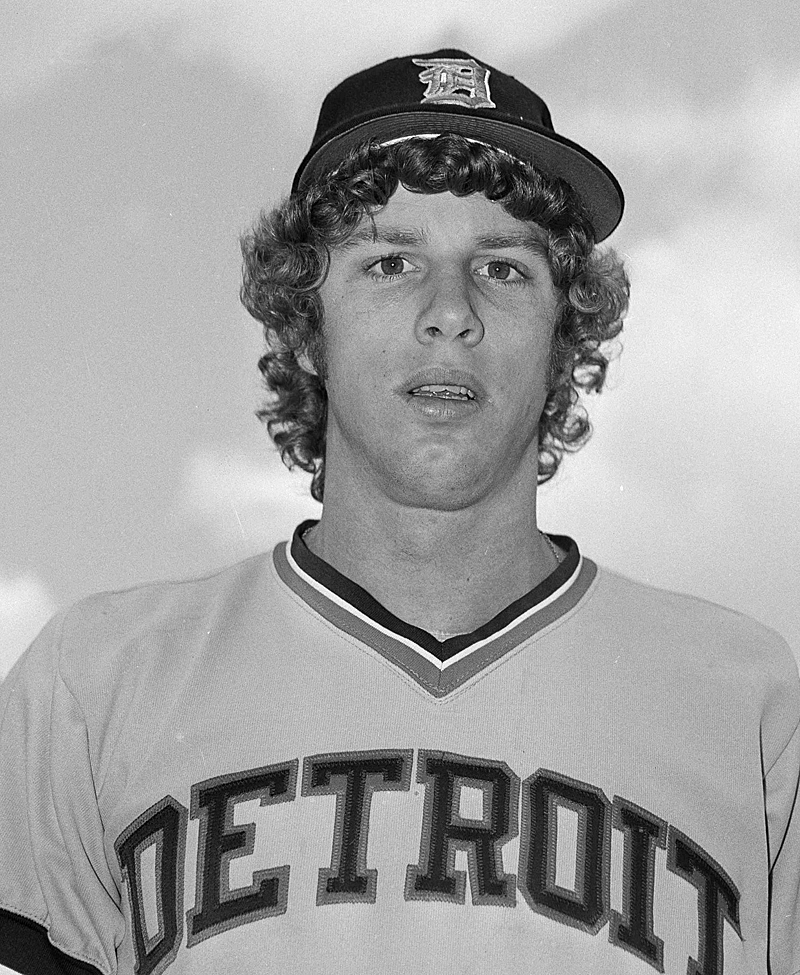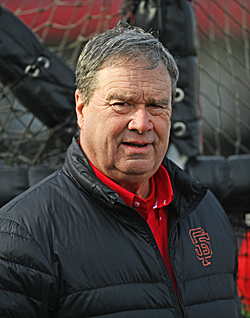
Former Detroit Tiger Mark Fidrych was a rarity, as good with people as he was with baseball. (Private Collection Photo)
As fate would have it baseball has given me many opportunities to meet and observe some very special people, and some of the most unique I’ll ever meet. As we embark on another chapter of ‘hope springs eternal’ this weekend I remember one of the most unique…a guy they called “The Bird”.
 You’re very familiar by now with my penchant for writing about anniversaries of the passing of famous people – entertainers, military personalities, and especially the sports heroes of my youth.
You’re very familiar by now with my penchant for writing about anniversaries of the passing of famous people – entertainers, military personalities, and especially the sports heroes of my youth.
And as I prepared for this weekend’s opening of the 2023 college baseball season I found a slip of paper in a box full of slips of paper…from one of the most unique people I’ve met in my 50 years around baseball. It happened during the seven-plus seasons I spent umpiring in the minor leagues, and indeed it’s been years since I’d even thought about Mark ‘The Bird’ Fidrych.

Publisher/Editor Sonny Fulks writes the Big Ten and Buckeye baseball for Press Pros Magazine.com.
But back in 1976 there was no bigger name in baseball than that of Detroit Tiger rookie Mark Fidrych. He burst upon the scene that season, and pitched well. But it was his personality and frank humanity that endeared him to not only the sporting public, but people who didn’t know a thing about baseball, or even cared. They just liked “The Bird”.
Fidrych won the Rookie of The Year award in the American League in 1976, winning 19 games, and finished second in the Cy Young Award voting. He was a character, entertaining, talking the baseball as if to will it where he wanted it to go in the strike zone.
He would get on his hands and knees and manicure the pitching mound to his liking, even between at bats.
He wore funny-looking clothes compared to other major league stars. His favorite outfit was nothing more than well-worn blue jeans and a T-shirt. often one that someone had given him. He frequently came to the ballpark in flip flops.
He bore a striking resemblance to the Sesame Street character, “Big Bird”, hence the nicknamed that was hung on him (and one to which he never objected) ‘The Bird’.

Mark Fidrych became the first baseball player ever featured on the cover of Rolling Stone magazine in 1976.
I first saw him in the spring of 1975, umpiring in my first minor camp with the Detroit Tigers, in Lakeland, Florida. On the back fields of what they called “Tigertown” the minor leaguers played intra-squad games each day, and that’s where the rookie signees cut their teeth on professional baseball. That spring, in 1975…Fidrych was one of the rookies.
He started out camp pitching with the Bristol team, a rookie Short-A team in the Appalachian League – Bristol, Virginia.
Within a week he had been moved up to the Lakeland squad, the Tigers’ top A-Ball team in the Florida State League. He didn’t throw overly hard (maybe 90 mph), but he threw strikes and he threw the ball with movement. He could spot his breaking pitch, which amounted to a three-quarter delivery slider.
Then I saw him during the season in the Florida State League, pitching for Lakeland, and he had so-so success. The records online list that he won 5 games, and lost 9.
The following spring (1976) I was assigned to the Royals camp in Sarasota, and missed seeing him altogether when visiting teams came in to play. In fact, I never even thought of Mark Fidrych that spring until to my surprise I saw that he had made the opening day roster of the Tigers’ big league club.
He won 19 games that summer for the Tigers and became the rage of the country, not only in baseball, but through appearances on the cover of “Rolling Stone” and with every TV commercial opportunity that beckoned. He didn’t do it for the money, he would truthfully say. He was just having fun.
The fun was short-lived for the sake of his big league career, because injuries set in and Mark Fidrych set about seeking answers, and remedies, for a sore arm. He made one brief try at a comeback with the Tigers in 1979 and again in 1980 before being sent down to Triple A Evansville, where I met up with him for a second time.
It was my second year in the American Association (AAA) and Fidrych was sent there to find whatever was left of his baseball career. Sitting in the front row of the box seats before a game in tired old Bosse Field one night, Fidrych walked up to me and stuck out his hand.
“Hey, I remember you from Lakeland,” he said. “Where you been?”
Odd to me that he would remember, and two, that he would even speak. Fraternization between umpires and players was strictly frowned upon in that day, and the code of minor league umpires was that you avoided making small talk at all.
“Southern League in ’77 and ’78”. I answered. “Came to the Association last year.”
“Crazy business, huh?” Fidrych said with a smile. “I’m still trying to figure it out. Still trying to find it again. People here are great, though. Worse places to be than Evansville. It’ll be OK.”
 Not really, in fact, but I saw him several times that season from behind home plate. His fastball had nothing on it, and his slider didn’t have the bite it once had. Fidrych had to rely on pinpoint location of his pitches, and when he didn’t have it he got hammered.
Not really, in fact, but I saw him several times that season from behind home plate. His fastball had nothing on it, and his slider didn’t have the bite it once had. Fidrych had to rely on pinpoint location of his pitches, and when he didn’t have it he got hammered.
Detroit was patient with him, for old time’s sake, and he knew that. He worked at his conditioning like no one I’d ever seen, but there simply were no results for his effort. At the end of season he was called up to Detroit where he had only marginal success. And despite his popularity, for who he once was, even the fans turned on his ineffectiveness. Major league baseball is cruel that way.
Of course, he was never “OK” again, not like he hoped. The arm miseries continued and by 1984, then a member of the Red Sox organization, he was out of baseball and back on his farm in Massachusetts. For all of his bad luck, Fidrych took good care of his money and set himself up for a good life after baseball.
Working under a farm truck on April 13, 2009, he was found dead, the victim of an apparent accident. He was 54.
He still stands out to me still because few professional sports figures I’ve ever met were as down to earth and gracious to others. I really believe that he believed that if you did until others and gave more than they were bound to give back to you…that someday everything in life would be fine.
And I know for sure that few people I ever met handled fame as well as Mark Fidrych.
But most impressively, no one I’ve ever met handled his fall from fame as well, either.
That slip of paper?
The last time I saw him I was working home plate on a night when he pitched against Omaha and got shelled – didn’t last two innings. There were some questionable pitches that didn’t help, but not many. Anything close to the plate got hammered. Jim Leyland was managing the Triplets that year and when he came to get him there was a smattering of boos mixed with a few cheers from those who remembered the good days.
The game ultimately went extra innings, and when it was over and my crew got back to the umpires’ room I found the piece of paper taped to my locker. It read: Not your fault. Thanks…



